loanDepot Bundle
Who Really Owns loanDepot?
Unraveling the loanDepot SWOT Analysis will provide a comprehensive understanding of its current position. Understanding the intricacies of loanDepot ownership is key to grasping its strategic direction and future prospects. From its IPO to the present day, the company's ownership structure has undergone significant transformations, impacting its market influence and governance.
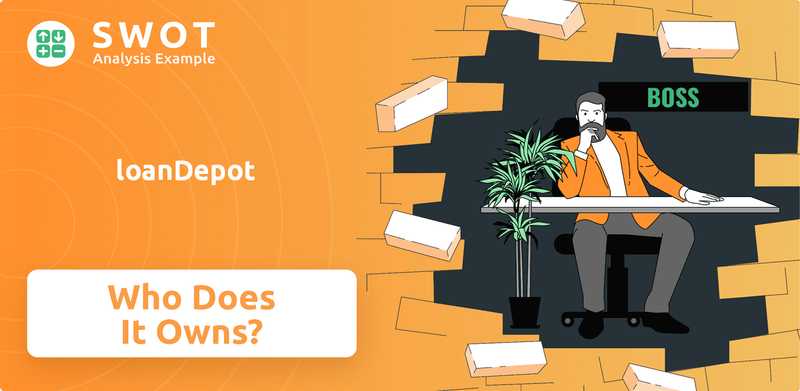
This analysis goes beyond surface-level data, exploring the loanDepot parent company and its evolution since its founding in 2009 by Anthony Hsieh. We'll examine the roles of loanDepot executives, loanDepot investors, and the impact of loanDepot stock performance on shareholder value. This deep dive into who owns loanDepot provides a crucial perspective for anyone evaluating the company's long-term viability and strategic alignment within the competitive mortgage market.
Who Founded loanDepot?
The inception of loanDepot in 2009 marked the beginning of a new venture led by Anthony Hsieh, an entrepreneur with a proven track record in the mortgage industry. Hsieh's prior successes, including the founding and sale of LoansDirect.com and HomeLoanCenter.com, provided him with valuable experience and insights that shaped loanDepot's strategic direction.
Hsieh's vision for loanDepot centered on creating a streamlined and efficient mortgage experience, leveraging technology and a direct-to-consumer approach. This focus differentiated loanDepot from traditional mortgage lenders and positioned the company for growth in a competitive market. The company's initial strategy was to simplify the mortgage process, making it more accessible to borrowers.
While the exact initial ownership structure of loanDepot is not fully detailed in public records, Anthony Hsieh is widely recognized as the founder and a significant controlling shareholder. Early financial backing came from private equity firm Parthenon Capital Partners, which played a crucial role in the company's early growth.
Anthony Hsieh founded loanDepot in 2009. He brought extensive experience from previous ventures in the mortgage industry.
Parthenon Capital Partners was one of the earliest investors in loanDepot. This early financial support was crucial for the company's initial development.
Hsieh's vision emphasized technology and a direct-to-consumer model. This approach aimed to streamline the mortgage process.
Anthony Hsieh has consistently been identified as a significant controlling shareholder. Specific equity splits at inception are not publicly available.
Hsieh previously founded and sold LoansDirect.com and HomeLoanCenter.com. These ventures provided valuable experience.
The company focused on technology and a direct-to-consumer approach from its early stages. This strategy aimed to improve efficiency.
Understanding the Revenue Streams & Business Model of loanDepot is crucial to understanding the company's financial performance and ownership structure. As of Q1 2024, loanDepot reported a net loss of $47.2 million. In 2023, the company originated $10.4 billion in total loan volume. The company's focus on digital lending and direct customer engagement has influenced its ownership dynamics, attracting both institutional and individual investors. The company's stock price has experienced fluctuations, reflecting market conditions and company performance. The company's leadership team and board of directors play a key role in shaping the company's future, impacting the interests of its shareholders. The company's ownership structure has evolved over time, influenced by factors such as market dynamics and strategic decisions.
loanDepot SWOT Analysis
- Complete SWOT Breakdown
- Fully Customizable
- Editable in Excel & Word
- Professional Formatting
- Investor-Ready Format
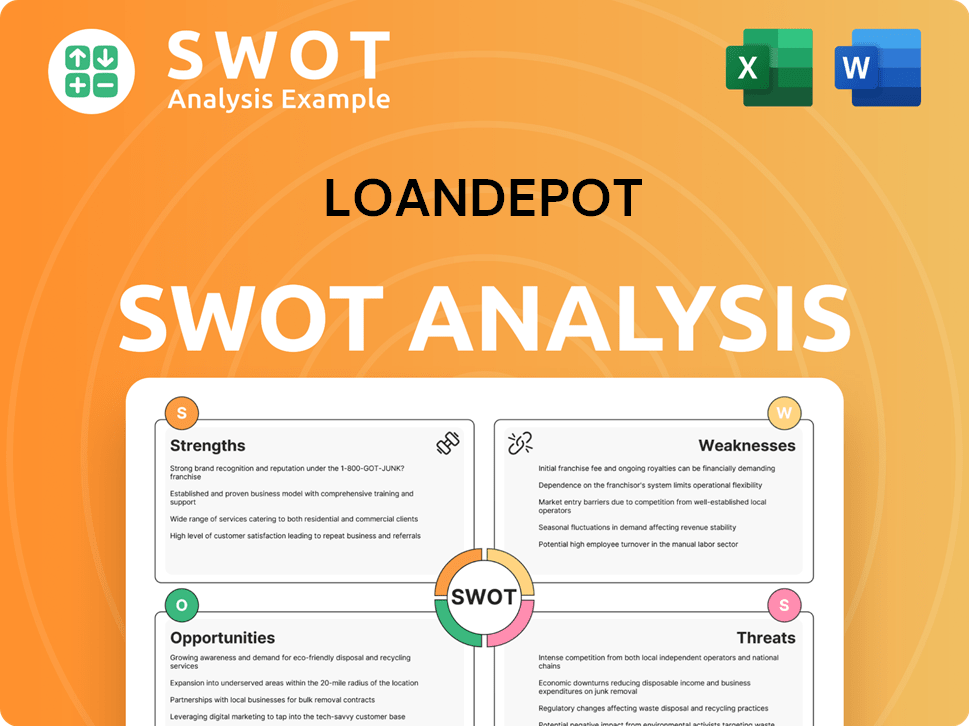
How Has loanDepot’s Ownership Changed Over Time?
The ownership structure of loanDepot significantly shifted with its initial public offering (IPO) on February 11, 2021. The company, which trades under the ticker symbol LDI on the New York Stock Exchange, offered 3.85 million shares of Class A common stock at $14.00 per share. This IPO raised $54 million, a downsized offering compared to initial plans. At the time of the IPO, loanDepot's market capitalization was approximately $2.79 billion. This event marked a pivotal moment, transforming the company from a privately held entity to a publicly traded one, opening it up to a broader range of investors and changing the dynamics of its ownership.
Post-IPO, loanDepot's ownership structure included multiple classes of common stock: Class A, Class B, Class C, and Class D. This structure granted different voting rights to different share classes. For example, holders of Class C and Class D common stock were entitled to five votes per share, concentrating voting control in the hands of certain shareholders. This multi-class structure influenced the distribution of voting power and the influence of various stakeholders within the company. The shifts in ownership, particularly after the IPO, have had a direct impact on the company's strategic direction and governance.
| Event | Date | Impact |
|---|---|---|
| IPO | February 11, 2021 | Transitioned loanDepot from private to public, introducing new investors and altering the ownership structure. |
| Stock Offering | February 2021 | Raised $54 million, providing capital for growth and operations. |
| Shareholder Structure | Post-IPO | Implementation of a multi-class common stock system (Class A, B, C, D), which concentrated voting power. |
Anthony Hsieh, the founder, has retained a significant stake and voting power. As of March 2023, he held approximately 57% of the combined voting power, making him the largest voting stockholder. Institutional investors also hold substantial shares. As of August 2024, Dimensional Fund Advisors LP held 198,724 shares, and Wolverine Asset Management LLC held 1,019,910 shares. Other notable institutional holders include Goldman Sachs Group Inc., Invesco Ltd., and Charles Schwab Investment Management Inc. These major shareholders and their holdings directly influence the company's strategy and governance. To learn more about the company's strategic direction, consider reading about the Growth Strategy of loanDepot.
loanDepot's ownership structure has evolved significantly, particularly after its IPO in 2021.
- The IPO introduced a multi-class stock structure, concentrating voting power.
- Anthony Hsieh, the founder, remains the largest voting stockholder.
- Institutional investors like Dimensional Fund Advisors and Wolverine Asset Management hold significant shares.
- These ownership dynamics influence the company's strategic direction and governance.
loanDepot PESTLE Analysis
- Covers All 6 PESTLE Categories
- No Research Needed – Save Hours of Work
- Built by Experts, Trusted by Consultants
- Instant Download, Ready to Use
- 100% Editable, Fully Customizable
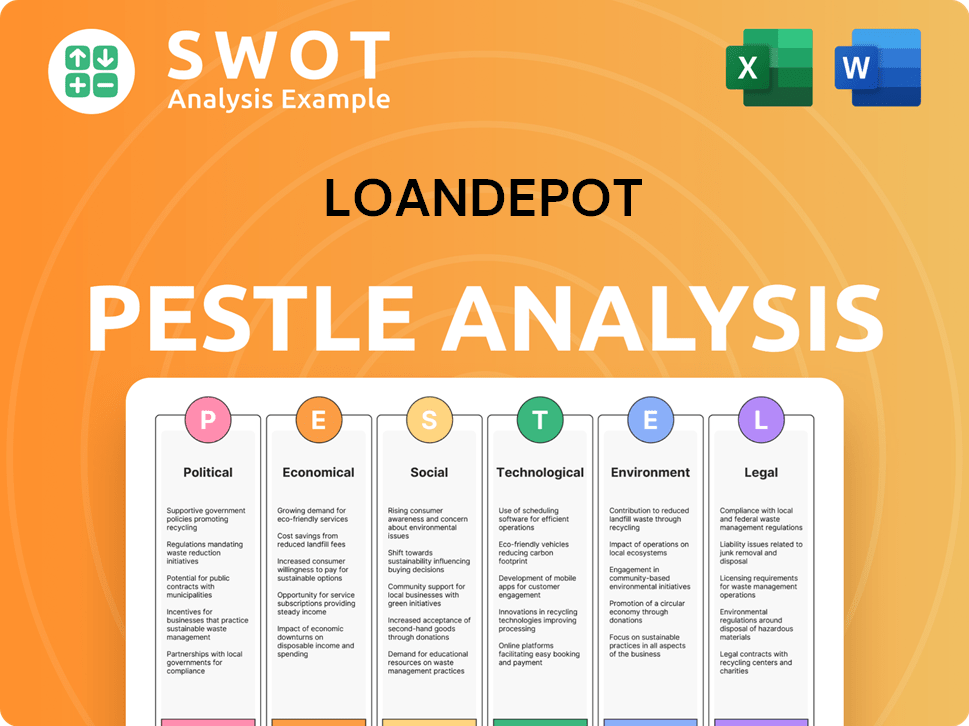
Who Sits on loanDepot’s Board?
The current board of directors at loanDepot plays a significant role in the company's governance. As of June 2025, Anthony Hsieh, the founder, serves as the Executive Chairman, Interim Chief Executive Officer, and President. He has been the Chair of the Board since February 2021. Other board members include individuals who may represent major shareholders or independent seats. For instance, Andrew Dodson is a board member who represents Parthenon Capital LLC, an early venture capital backer of loanDepot. Pamela Hughes Patenaude has been a director since July 2021, and John Lee has been a director since April 2022.
The composition of the board reflects the influence of major stakeholders and the company's history. This structure is crucial for understanding the dynamics of loanDepot ownership and the decision-making processes within the company. The board's decisions and the influence of key individuals shape the strategic direction and operational performance of loanDepot.
| Director | Title | Affiliation |
|---|---|---|
| Anthony Hsieh | Executive Chairman, Interim CEO, and President | Founder |
| Andrew Dodson | Director | Parthenon Capital LLC |
| Pamela Hughes Patenaude | Director | Independent |
| John Lee | Director | Independent |
The company's multi-class share structure significantly impacts voting power, which is a key aspect of understanding who owns loanDepot. loanDepot has Class A, Class B, Class C, and Class D Common Stock. While Class A and Class B common stock each entitle their holder to one vote per share, Class C and Class D common stock grant five votes per share. This structure concentrates voting control with those stockholders who held capital stock prior to the IPO, including Anthony Hsieh and his affiliates (the 'Hsieh Stockholders') and Parthenon Stockholders. Collectively, these entities held 97.4% of the voting power of loanDepot's capital stock following the IPO. As of March 2023, Anthony Hsieh alone held approximately 57% of the combined voting power. This concentration of voting power allows major shareholders to significantly influence corporate decisions.
The multi-class share structure gives significant voting power to certain shareholders, particularly Anthony Hsieh and his affiliates. This structure impacts the dynamics of loanDepot ownership and the ability of other shareholders to influence company decisions.
- Anthony Hsieh held approximately 57% of the combined voting power as of March 2023.
- The Hsieh Stockholders and Parthenon Stockholders held 97.4% of the voting power following the IPO.
- This structure allows major shareholders to influence board nominations and strategic decisions.
- The staggered election system can make changes to the board composition challenging.
loanDepot Business Model Canvas
- Complete 9-Block Business Model Canvas
- Effortlessly Communicate Your Business Strategy
- Investor-Ready BMC Format
- 100% Editable and Customizable
- Clear and Structured Layout
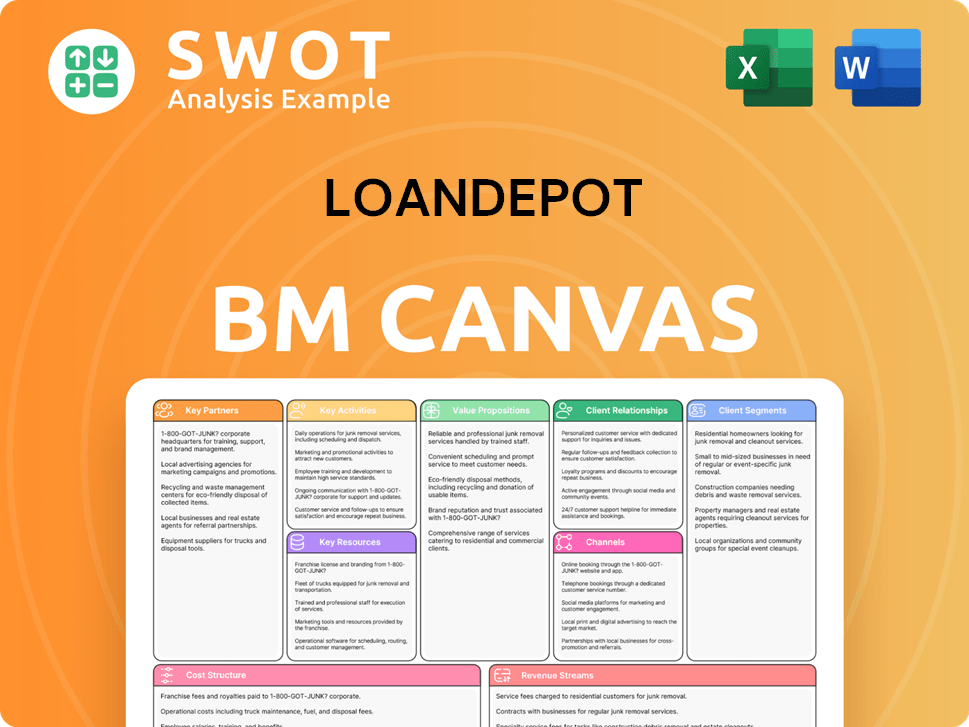
What Recent Changes Have Shaped loanDepot’s Ownership Landscape?
Over the past few years, there have been significant shifts in the ownership and leadership of loanDepot. Anthony Hsieh, who previously held the positions of chairman and CEO, transitioned to the role of executive chairman in April 2022. Frank Martell took over as president and CEO. However, effective March 6, 2025, Anthony Hsieh returned to the executive leadership team as Executive Chairman of Mortgage Originations. Frank Martell transitioned to a Board advisory role, effective at the company's annual stockholder meeting on June 4, 2025. As of June 2025, Hsieh was appointed Executive Chairman, Interim Chief Executive Officer, and President.
These changes reflect a dynamic environment for loanDepot, impacting the company's structure and potentially influencing its strategic direction. Understanding the current loanDepot ownership is crucial for investors and stakeholders. The company's leadership transitions and financial performance are key factors in assessing its future prospects and stability. These changes are happening amid broader industry trends, including increased merger and acquisition activity within the mortgage sector.
| Key Ownership and Leadership Changes | Details | Date |
|---|---|---|
| Anthony Hsieh | Executive Chairman of Mortgage Originations, Interim CEO, and President | June 2025 |
| Frank Martell | Board advisory role | June 4, 2025 |
| Refinancing of Corporate Debt | Reduced outstanding corporate debt by $137 million | 2024 |
Financially, loanDepot saw a return to profitability in the third quarter of 2024, reporting a net income of $2.7 million, a significant improvement compared to a net loss of $34.3 million in the third quarter of 2023. Revenue also increased by 18% to $315 million in Q3 2024. For the full year 2024, revenue increased by 9% to $1.06 billion. However, the company reported a net loss of $202 million for 2024, which included $25 million in cybersecurity-related costs from an incident in January 2024. The shifts in leadership, coupled with the financial performance, provide a comprehensive view of the company's current state. Industry trends also suggest an uptick in mortgage mergers and acquisitions (M&A) in 2025. This could further influence the loanDepot ownership structure, potentially through strategic deals and investments, as the market evolves. Understanding the loanDepot parent company and its stakeholders is critical for evaluating the company's future.
Anthony Hsieh is the current Executive Chairman, Interim CEO, and President. Frank Martell transitioned to a Board advisory role. These changes reflect the dynamic nature of the company's leadership.
loanDepot returned to profitability in Q3 2024 with a net income of $2.7 million. Revenue increased by 18% in Q3 2024. Full-year 2024 revenue was $1.06 billion.
Mortgage M&A activity is expected to increase in 2025. This could lead to changes in loanDepot's ownership structure. Market conditions are improving for mortgage origination.
The company is investing in platforms and solutions. This is part of its 'Project North Star' strategic blueprint. This builds on the 'Vision 2025' program.
loanDepot Porter's Five Forces Analysis
- Covers All 5 Competitive Forces in Detail
- Structured for Consultants, Students, and Founders
- 100% Editable in Microsoft Word & Excel
- Instant Digital Download – Use Immediately
- Compatible with Mac & PC – Fully Unlocked
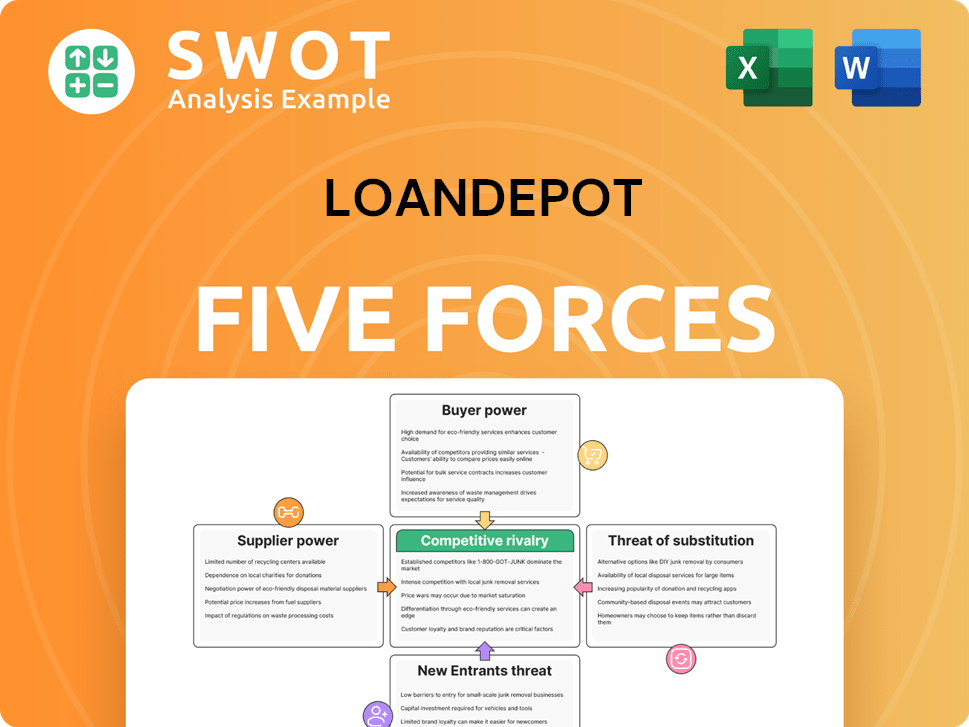
Related Blogs
- What are Mission Vision & Core Values of loanDepot Company?
- What is Competitive Landscape of loanDepot Company?
- What is Growth Strategy and Future Prospects of loanDepot Company?
- How Does loanDepot Company Work?
- What is Sales and Marketing Strategy of loanDepot Company?
- What is Brief History of loanDepot Company?
- What is Customer Demographics and Target Market of loanDepot Company?
Disclaimer
All information, articles, and product details provided on this website are for general informational and educational purposes only. We do not claim any ownership over, nor do we intend to infringe upon, any trademarks, copyrights, logos, brand names, or other intellectual property mentioned or depicted on this site. Such intellectual property remains the property of its respective owners, and any references here are made solely for identification or informational purposes, without implying any affiliation, endorsement, or partnership.
We make no representations or warranties, express or implied, regarding the accuracy, completeness, or suitability of any content or products presented. Nothing on this website should be construed as legal, tax, investment, financial, medical, or other professional advice. In addition, no part of this site—including articles or product references—constitutes a solicitation, recommendation, endorsement, advertisement, or offer to buy or sell any securities, franchises, or other financial instruments, particularly in jurisdictions where such activity would be unlawful.
All content is of a general nature and may not address the specific circumstances of any individual or entity. It is not a substitute for professional advice or services. Any actions you take based on the information provided here are strictly at your own risk. You accept full responsibility for any decisions or outcomes arising from your use of this website and agree to release us from any liability in connection with your use of, or reliance upon, the content or products found herein.